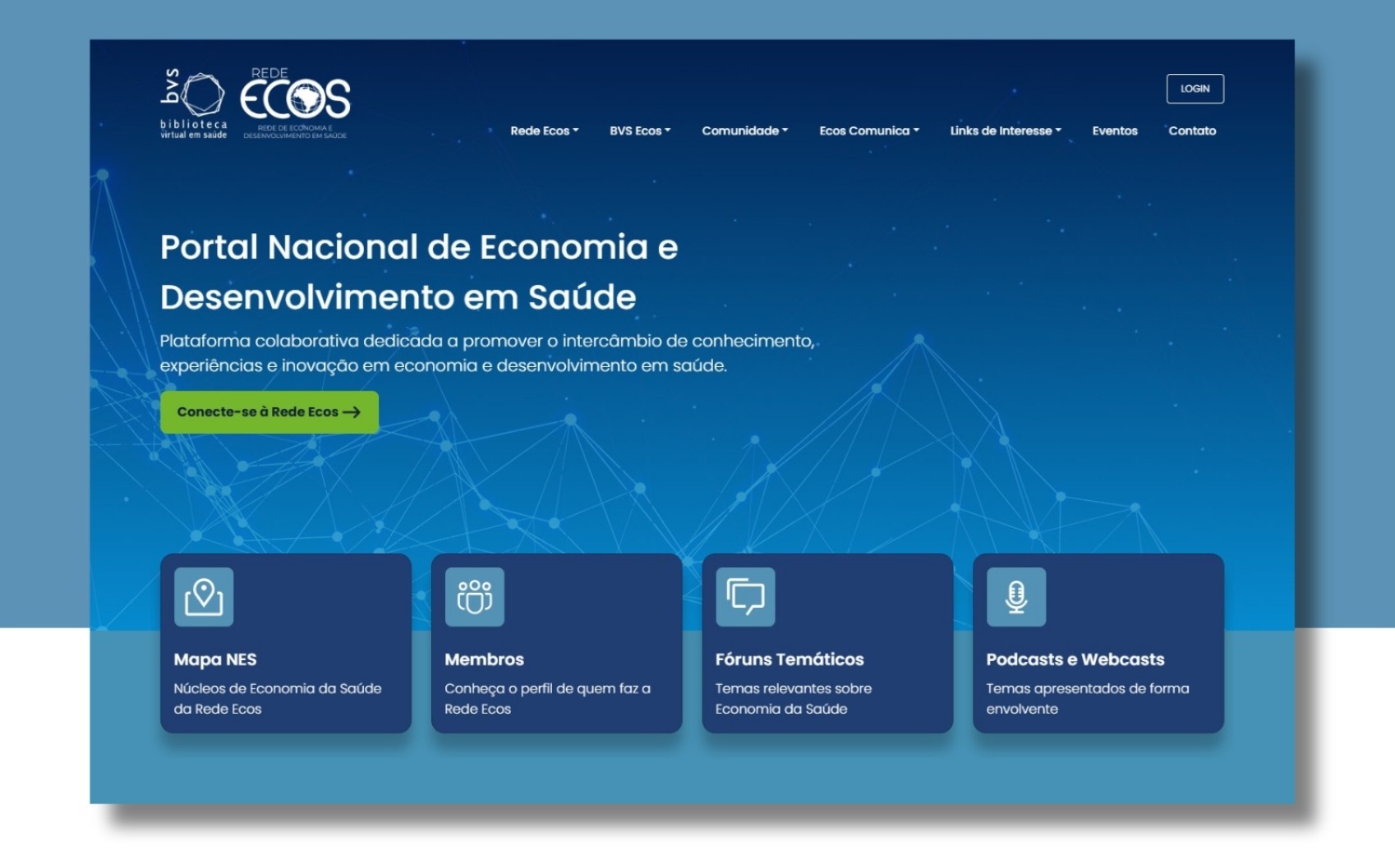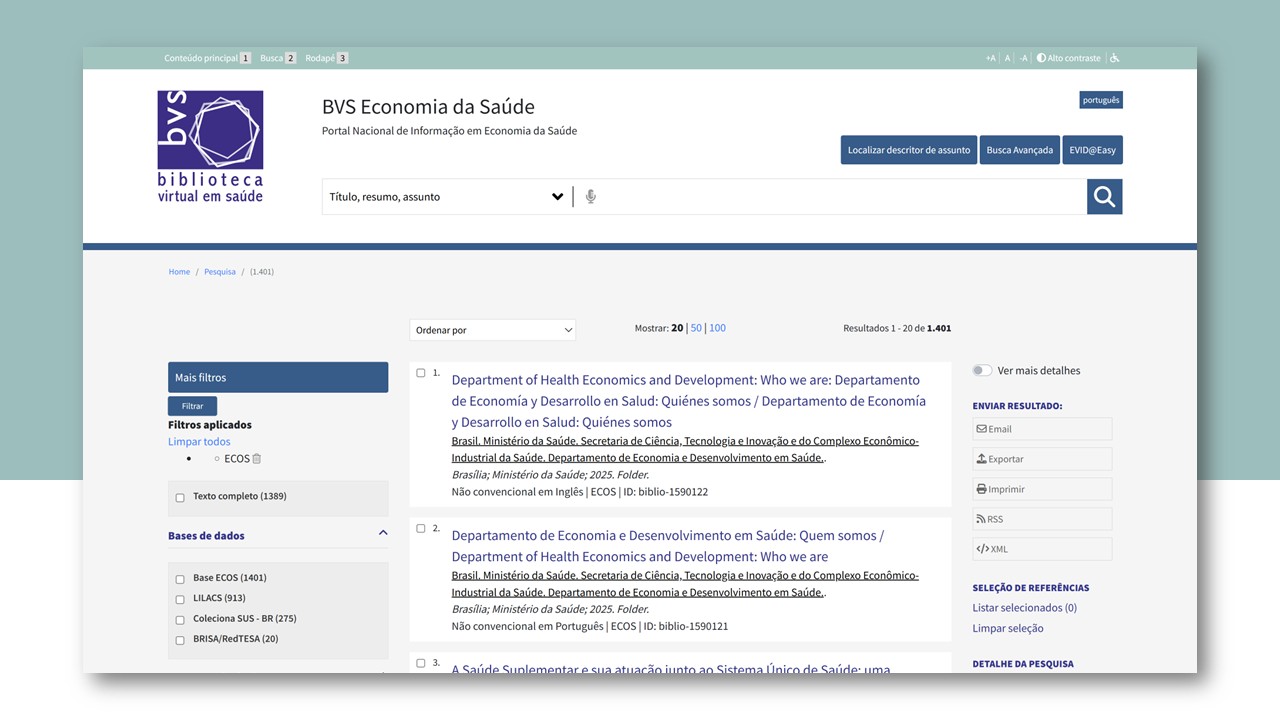The overhaul of the Health Economics VHL is the result of the seventh phase of the Project to Strengthen the ECOS VHL, aimed at disseminating scientific and technical information in the area in Brazil. The project is the result of a partnership between the Department of Health Economics and Development (DESID) of the Brazilian Ministry of Health and the Latin American and Caribbean Center on Health Sciences Information (BIREME), within the framework of technical cooperation between the Pan American Health Organization/World Health Organization (PAHO/WHO) and Brazil’s Ministry of Health.
Developed under BIREME’s coordination, the new portal fully integrates the ECOS Network, becoming a collaborative platform for the exchange of knowledge, experiences and innovation. “The aim is to facilitate the exchange of knowledge and experiences between managers and specialists in Health Economics, promoting access to scientific and technical information and, at the same time, interaction between members of the Network,” stated Joanita de Barros, Senior Information Analyst at BIREME and Product Owner of the project.
The development of the portal was guided by a survey on the profile and needs of the ECOS Network, combined with an intense process of collaboration with the DESID team. The result is an environment that offers access to information about the Network, the Health Economics Centers, Thematic Groups, Discussion Forums and News, in addition to scientific and technical content, already traditionally made available by the ECOS VHL databases.
Among the main implementations of the new portal is the technology update, with the installation of the latest version of WordPress, which provides the platform with greater security and stability. There was also a complete restructuring of the Information Architecture, with better content organization and more intuitive navigation for users. The full integration of the ECOS Network has resulted in an interactive space that encourages collaboration and knowledge sharing through forums and thematic groups. Moreover, the portal has undergone a significant expansion of content, with the creation of sections dedicated to legislation, publications from the Health Economics Centers, Network reports, as well as podcasts, webcasts, and other multimedia resources.
For Joanita Barros, the redesign reflects an ongoing effort to improve access to information and foster the exchange of knowledge between and within the Network. “With this update, we hope that the new portal will consolidates itself as a reference space for the area of Health Economics, strengthening the ECOS Network, allowing greater interaction between specialists and managers in the area and facilitating access to quality information,” highlighted Joanita.
According to Jamyle Grigoletto, coordinator of the Coordination of Structuring Actions in Health Economics at DESID, the portal overhaul should bring together and facilitate discussions between the Health Economics Centers (NES, in its Portuguese acronym) implemented in the Health Secretariats of the States and Municipalities – and also between them and the representatives of academia, councils and associations in the area of Health Economics that make up the ECOS Network.
“The idea is that, based on these interactions, NES will indicate to the Network’s researchers what the demands are for cutting-edge economic studies, so that these demands can support conducting research. These, in turn, can be used to support decision-making by SUS managers. As a result, we will also see an expansion of the scientific output in health economics reflected in the ECOS VHL”, concluded Grigoletto.
Information sources and thematic areas
The ECOS VHL brings together a wide range of specialized information sources, offering access to databases and strategic repositories to support research and analysis in the area of health economics. Among the resources available are the ECOS Database, the Health Price Bank, the National Cost Management Program and the public consultations of the National Commission for the Incorporation of Technologies into the Unified Health System – SUS (CONITEC).
Resources from the Brazilian Network for Health Technology Assessment, the Regional Database of Health Technology Assessment Reports from the Americas (BRISA) and the Public Health Budget Information System are also integrated.
All the content is organized by thematic areas, ranging from general aspects of health economics to specific topics such as economic evaluation in health, financing and spending in the sector, management of health services, and equity and inequalities in health, among others. This structure facilitates navigation and search, allowing managers and researchers to find qualified information on which to base public policies and strategic decisions.
Health Economics and Development Network
On January 30, 2025, the Tripartite Interagency Commission agreed to formalize the Health Economics and Development Network (ECOS Network), an important milestone for strengthening the management of SUS. The initiative aims to improve governance and strengthen coordination between managers, specialists and researchers, promoting greater efficiency, transparency and a technical basis for decision making related to the allocation of resources in the public sector.
In this context, the new portal consolidates itself as a strategic hub for sharing knowledge and access to qualified information, contributing to evidence-based public policies.
Next steps
The project includes the development of two new Knowledge Showcases, which will highlight strategic information for managers and researchers in the field. Also planned is the creation of an Evidence Map, a method for systematizing evidence and graphically representing interventions and outcomes in the specific area of the map, as well as identifying evidence gaps.
Access the new Portal and find out what’s new in the Health Economics VHL | National Portal on Health Economics Information.

